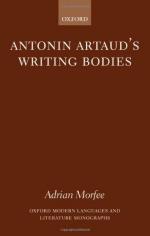|
This section contains 3,817 words (approx. 13 pages at 300 words per page) |

|
“Antonin Artaud: Metaphysical Revolutionary,” in Yale French Studies, No. 39, 1967, pp. 188-97.
In the following essay, Greene traces Artaud's concept of language, his distinction between political and cultural revolution, and the changes in his thought regarding whether body or spirit has primacy.
Albert Camus has written that there are fundamentally two types of revolution: one—characterized as revolt—is metaphysical; the other, political. A metaphysical revolutionary rebels against the limitations placed upon him by the very nature of human existence, against the laws governing life and death. Unlike a political revolutionary, involved with the problems of society, he concerns himself with only the most universal and unchanging aspects of human life. His quest is absolute, for he demands not a new or better society, but a radical change in life itself—a transformation of the human condition. In this sense, Sade, Nietzsche, Dostoyevsky, Blake, Rimbaud, and Lautréamont were...
|
This section contains 3,817 words (approx. 13 pages at 300 words per page) |

|


